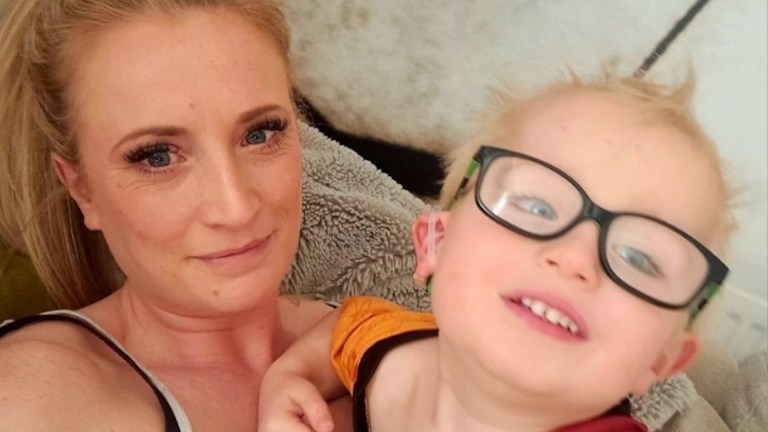Big Issue has reported extensively on the impact of benefit overpayments – such as on a single mother of disabled children who owes the DWP £17,000.
“I was running crazy,” Deboarh Makanju said of the overpayment. “I went numb. I can’t process it.”
Public Law Project has found that 42% of people had their mental health negatively impacted, and nearly one in three (30%) had their physical health impacted by deductions to their universal credit.
“That comes through really strongly from people when they’re speaking about their experiences of the stress and anxiety and unexpected reduction in income, which very often is something that is not their fault and that they have no had control over,” Selman said.
Deductions to universal credit are leading to nearly a third (29%) of people spending less on essentials like food, and one in four (26%) said they used food support such as food banks as a result.
Research shows that universal credit falls short of the money people need to survive before deductions – by around £120 each month, according to estimates from the Joseph Rowntree Foundation.
Advertising helps fund Big Issue’s mission to end poverty
Samuel Thomas, a senior policy advisor at anti-poverty charity Z2K, previously told the Big Issue: “The basic rate of universal credit is already so low.
“Once you’re having deductions that pull you below even that, the main impact we see is financial hardship. In the most extreme cases it can push people into destitution.”
Public Law Project argues deductions are also leading to evictions, with one in 10 people reporting they had slept rough for one or more nights as a result of a deduction from their universal credit.
Around 21% of people had to delay bill repayments, 21% took out additional loans, and 19% had to borrow money from family and friends, and 12% took out additional credit card debt.
People impacted by overpayments have previously told the Big Issue of their “confusion” in attempting to appeal their benefit overpayments and get help, a claim supported by the research.
“Some of the people who are potentially most likely to be impacted by by this policy are also people who face some of the highest barriers to being able to access relief and access support in relation to it,” Selman said.
Advertising helps fund Big Issue’s mission to end poverty
Official government figures show that an estimated 0.3% of universal credit overpayments are caused by errors made by the DWP – equating to £0.8bn.
However a Freedom of Information Request from Public Law Project in 2021 showed that 75% of universal credit overpayments were caused by official error, as recorded on the DWP’s Debt Manager system.
“We are concerned with the volume of overpayments that are being driven by DWP own mistakes,” Selman said. “And we think there needs to be a relook at that and the extent to which they are recovering overpayments that are not caused by individual fault or individual error or anything like that – but are being caused by DWP.”
One of Public Law Projects’ clients was a disabled widow who gave the DWP all of her information but still ended up with £7,392.20 of debt due to them miscalculating the impact of her widow’s pension on her universal credit.
She told the Big Issue: “The DWP should be held accountable for their mistakes, especially if it means people like me are pushed into thousands of pounds worth of debt that we are not responsible for.
“If they were to be held accountable it may force them into training their staff properly and putting a checking process in place to make sure any error is identified and dealt with before it causes any financial harm or emotional stress to the claimant, many of whom are already under extreme pressure due to having to survive on benefits in the first place.”
Advertising helps fund Big Issue’s mission to end poverty
There are also instances where the accusation of overpayment could be incorrect – as in the case reported by the Big Issue in which a disabled woman was mistakenly accused of a £28,000 benefit overpayment.
“It is very difficult for people to be able to identify whether their overpayments have been correctly identified,” Selman said. “And in turn, it is difficult for people to challenge it if they think it is incorrect.
“You can’t challenge something if you don’t know it’s there, or you don’t know the reason that it was incurred. That raises a very serious concern about the potential for people to have recovery of a debt that is not even a correct overpayment.”
Public Law Project is joining calls for a reduction in the default rates of recovery for deductions. It is also urging the DWP to assess claimants’ individual circumstances before recovering an overpayment.
“There is significant need for DWP to improve coordination between departments and the information that is provided to people as well,” Selman said. “One of the things that came through very clearly and starkly from speaking to people was the poor quality of that information was exacerbating the impact.”
The organisation found that some claimants have money taken from their universal credit before being alerted of the deduction, and it argues that claimants should be contacted before recovery is triggered to establish an affordable repayment plan.
Advertising helps fund Big Issue’s mission to end poverty
It also wants the DWP to improve consistency and quality of communication, and for people to be told about all available remedies and hardship measures.
A DWP spokesperson said: “We know far too many people are living in poverty which is why we’ve extended the household support fund and committed to reviewing universal credit so that it makes work pay, as we fix the foundations of our country to spread opportunity and prosperity to all.”
Do you have a story to tell or opinions to share about this? Get in touch and tell us more. Big Issue exists to give homeless and marginalised people the opportunity to earn an income. To support our work buy a copy of the magazine or get the app from the App Store or Google Play.









